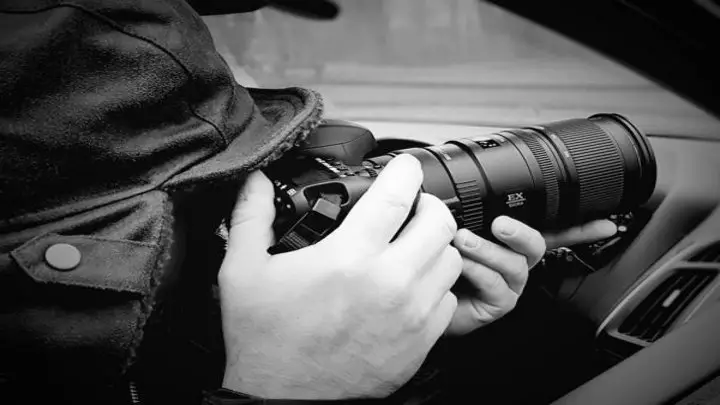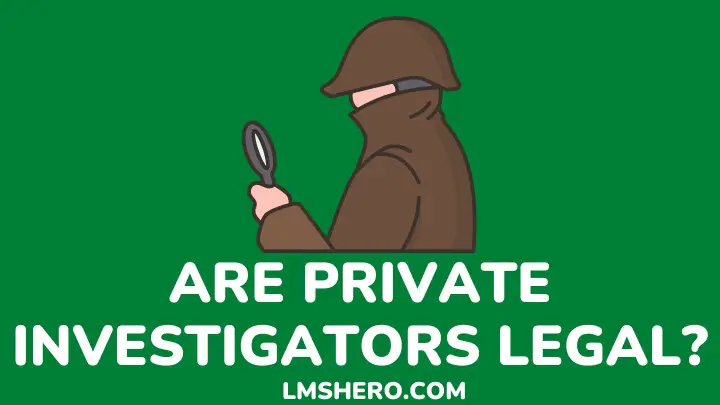Do you wonder if private investigators are legal? Well, the answer is yes.
Private investigators are hired for several reasons, including finding someone or digging up info. However, there are legal limitations to what he or she can do in every jurisdiction.
In this article, I will discuss private investigators, why people hire them, what they are legally allowed to do, and what is not legal.
Let’s get started.
Who is a private investigator?

A private investigator, also known as a Private detective, gathers and verifies facts for a case.
Private investigators also provide expertise in areas where verification is needed, such as insurance fraud or investigating investment groups.
Is the use of private investigators legal?
Yes, it is. Hiring a private detective to work on your case does not violate any laws. However, there are certain conducts or activities the detective cannot engage in that violates the law.
Why do people hire private investigators?
There are several reasons people look for the service of a private investigator. Some of these reasons are;
1. Locating someone
Private investigators are hired to help locate someone declared missing or simply hiding.
They can also help find someone who is in debt or kidnapped. They do this by picking up clues to decipher the target’s whereabouts.
2. Locating properties
In divorce cases, private investigators are often hired to help locate or learn more about the property the other person owns.
They go as far as unraveling properties the other person once owned still owns or is trying to purchase.
3. Collecting evidence
In civil cases, private investigators gather information or evidence about the other party.
While in divorce cases, they are used to gather evidence of whether the other party is faithful.
In cases of child abuse or custody case, they are used to gather evidence to support a claim in court.
4. Run background checks
People also hire private detectives to run background checks on individuals or groups. This could be because the client suspects foul play or just to know more about someone.
Occasionally, they are used by clients to confirm or investigate investment groups. This is done to know if such a group is legit or if they have a license to operate in that jurisdiction.
5. Assisting lawyers
Civil lawyers or criminal defense lawyers also use private investigators. They help in gathering more evidence about a case or a client.
For example, if a lawyer suspects a victim who claims to have suffered an injury is lying, he or she uses the investigator to verify.
They gather information to either support the claim or to prove that the victim is lying.
6. Investigate potential internet fraudsters
You can also seek the service of a private investigator to investigate someone you met online. That is if you suspect he or she might be trying to extort or defraud you.
6. Personal service
Many people hire private investigators for other personal services.
For example, if you feel you are being watched or followed, you can seek an investigator’s help. This way, he researches to discover if your life is in danger.
What is a private investigator legally and not legally allowed to do?
Now that you know who a private investigator is and why people seek their services let’s see what they can do and their limitations.
What private investigators can do?
1. Conduct surveillance
Private investigators are legally allowed to perform surveillance at any time of the day. This involves stakeouts and also using different research tools to gather evidence.
2. Work undercover or impersonate someone
They can also work undercover or pose as someone else to get more information. These undercover operations may include posing as a worker, neighbor, or old associate.
3. Search record
Private investigators are also allowed to search public records to gather more information. They can gather information from aliases, former co-workers, or former neighbors or spouses.
4. Follow their target
They can follow their target to gather more information about their activities. This is usually done discretely, although many investigators don’t feel the need to follow their targets.
5. Take pictures of the target
In gathering evidence, they can take photos of their target, who they interact with, and where they are.
Legal limitations of a private investigator
1. Impersonating a law enforcement agent
While they are allowed to run undercover operations, they are prohibited from impersonating a law enforcement agent. This includes putting on a police uniform or carrying a police badge.
When conducting interviews, they are also prohibited from telling people they are enforcement agents.
2. Arrest a target
The law also prohibits them from arresting any of their targets. This is because their mission is solely to gather information or verify them.
3. Wiretapping a target’s phone
Federal law prohibits private investigators from wiretapping a target’s phone calls without consent.
Also, they cannot bug the target’s house to gather information.
4. Trespass
In the means of gathering information, private investigators are not allowed to trespass into private properties. They are also not allowed to break into the target’s house for any reason.
However, he can enter if he gets permission from the property owner. This mostly applies to divorce cases when both parties reside in the same house.
5. Accessing information illegally
While they can search public records, they are prohibited from doing it illegally. This involves breaking into record rooms or hacking government databases.
They can only get information through normal means, such as online searches and social media.
What do you do if you find a private investigator violating the law?
Contact your lawyer if you find a private investigator to violate the law. These violations also give you the right to seek a lawsuit against him or her.
If the lawyer can gather enough evidence, he or she can bring it before the court.
FAQs
Can private investigators stalk you?
Technically, they are allowed to follow their target to get more information.
Are private investigators supposed to carry badges?
No, they aren’t. Besides, federal laws prohibit them from carrying a badge or even wearing any official police uniform.
Are private investigators cops?
No, they are not. Although most of them are former law enforcement agents, they are not cops and cannot arrest you.
Can private investigators access criminal records?
Yes, they can. However, if this information is deemed confidential by the government, they are not allowed access.
Can private investigators carry guns?
No, they can’t. Only if they possess an official license to carry a gun.
Conclusion
Private investigators are legal, and they are hired by individuals or organizations dealing with civil or criminal matters
They are legally allowed to perform several tasks to acquire information. However, there are limitations to what they are allowed to do.
If you find anyone violating the law, do well to report it to your lawyer, with evidence if there are any.
I hope you enjoyed reading this article. If you did, you should also see what a probation officer can and not do.
Thanks for reading.







